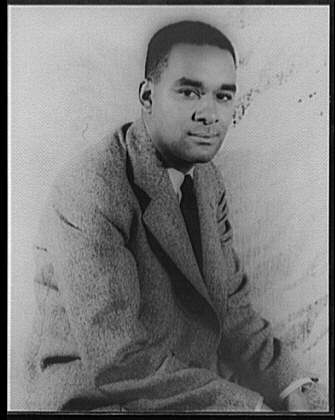
Bruce Levine
Born:
Pen Name: None Connection to Illinois: Bruce Levine is a Professor of History at the University of Illinois at Urbana/Champaign. Biography: Bruce Levine is the J. G. Randall Distinguished Professor of History at the University of Illinois. An associate editor of the Civil War magazine ''North and South'', he has published three books on the Civil War era.
Awards:
- ''Confederate Emancipation
Website: http://www.history.illinois.edu/people/blevine3
Bruce Levine on WorldCat : http://www.worldcat.org/search?q=bruce+levine+
Selected Titles
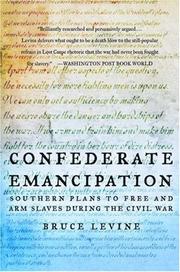 |
Confederate emancipation : ISBN: 0195315863 OCLC: 74966415 Oxford University Press, New York ; 2007. "In Confederate Emancipation, Bruce Levine looks closely at the 1864 proposal to arm and free slaves of the South - a proposal advanced most famously by Major-General Patrick Cleburne - after the disastrous results at the Battle of Chattanooga."--Back cover. |
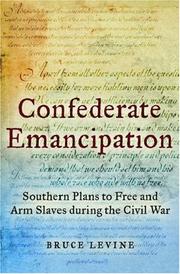 |
Confederate emancipation : ISBN: 0195147626 OCLC: 60188366 Oxford University Press, Oxford, England ; 2006. In Confederate Emancipation, Bruce Levine looks closely at Confederate plans to arm and free slaves. Throughout the book, Levine captures the voices of blacks and whites, wealthy planters and poor farmers, soldiers and officers, and newspaper editors and politicians from all across the South. In the process, he sheds light on such hot-button topics as what the Confederacy was fighting for, whether black southerners were willing to fight in large numbers in defense of the South, and what this episode foretold about life and politics in the post-war South.--Jacket. |
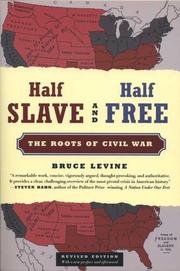 |
Half slave and half free : ISBN: 0809053535 OCLC: 57391455 Hill and Wang, New York : 2005. "Half Slave and Half Free is a succinct and persuasive treatment of the basic issues and social transformations that precipitated the Civil War. Now, in a revised edition that includes a new preface and afterword and a revised and expanded bibliographic essay, Bruce Levine's impressive work is brought completely up to date. Its argument is still compelling: that a popular basis for the Civil War developed out of the far-reaching and divisive changes in American life that came with the incomplete Revolution of 1776 changes that led to two very distinct social systems, one based on slavery, the other on free labor, which eventually made sectional differences within the framework of the Union irreconcilable."--BOOK JACKET. |
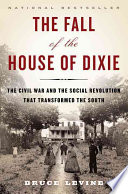 |
The fall of the House of Dixie : ISBN: 1400067030 OCLC: 765486287 Random House, New York : ©2013. In this major new history of the Civil War, Bruce Levine tells the riveting story of how that conflict upended the economic, political, and social life of the old South, utterly destroying the Confederacy and the society it represented and defended. |
| The fall of the house of Dixie : ISBN: 9781470360054 OCLC: 841295478 Findaway World, LLC ; [Solon, Ohio] : [2013], ℗2013. Levine presents a gripping chronicle of the cultural and economic upheaval the South experienced during and after the Civil War. Drawing upon a treasure trove of diaries, letters, newspaper articles, and government documents, Levine offers a unique perspective on the old South's demise through the voices of those who lived through the conflict. |
|
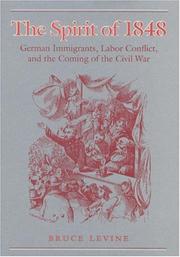 |
The spirit of 1848 : ISBN: 0252018737 OCLC: 24375611 University of Illinois Press, Urbana : ©1992. "Immigrants and their children became the chief component of the U.S. working class during the nineteenth century. Bruce Levine examines the early years of this social transformation, focusing on German-born craft workers and the key roles they played in the economic and political life of the wage-earning population of antebellum America. Interweaving themes often treated separately--immigration, industrialization, class formation, and the political polarization over slavery--Levine sheds new light on the development of the working class, the nature and appeals of partisan politics, and the conflicts that led to sectional war." "This study begins by carefully delineating the European background of these emigrants, especially their involvement in the economic, political, and cultural developments that culminated in the revolution of 1848. It then follows them to the New World, where it locates them within the multi-class German-American population. The author subtly analyzes the deepening political divisions within German-America, differentiating conservative, liberal, radical-democratic, and Marxist currents. At the same time, Levine explores the distinctive role that German-American workers played in American society at large--notably, in the multi-ethnic antebellum labor movement and in popular responses to the Kansas-Nebraska Act of 1854, the rise of the Republican party, and the outbreak of sectional war." "Throughout, Levine stresses the way in which European memories, traditions, and values conditioned (and were reshaped by) the immigrants' encounter with industrial, political, and cultural realities in their new land." "The volume concludes with a discussion of the legacy of the radical craftworker milieu in postbellum decades and an assessment of later attempts to ignore or minimize this aspect of German-American and American working-class history." |




